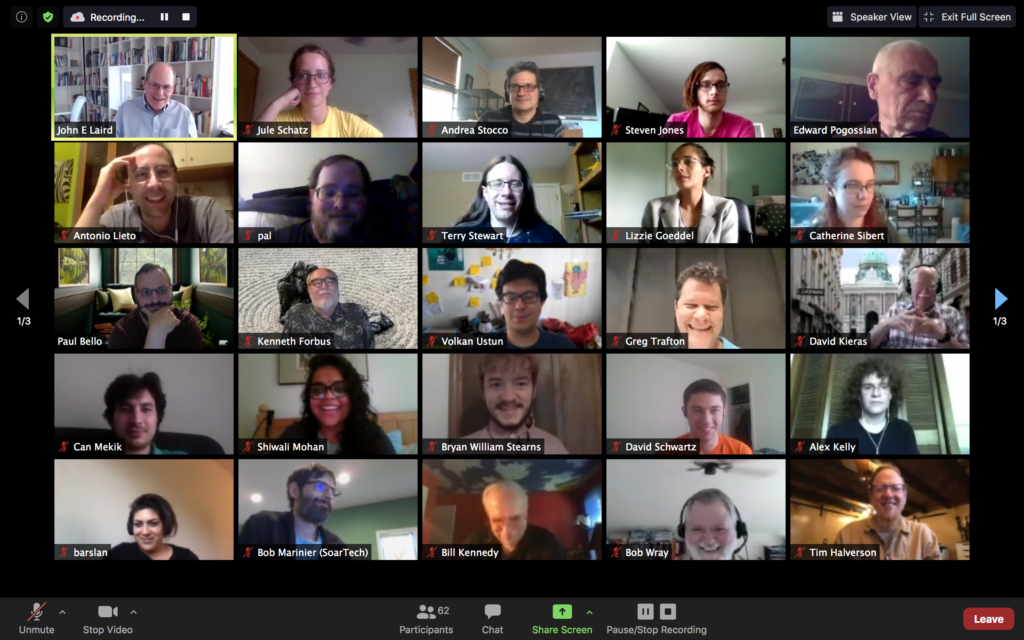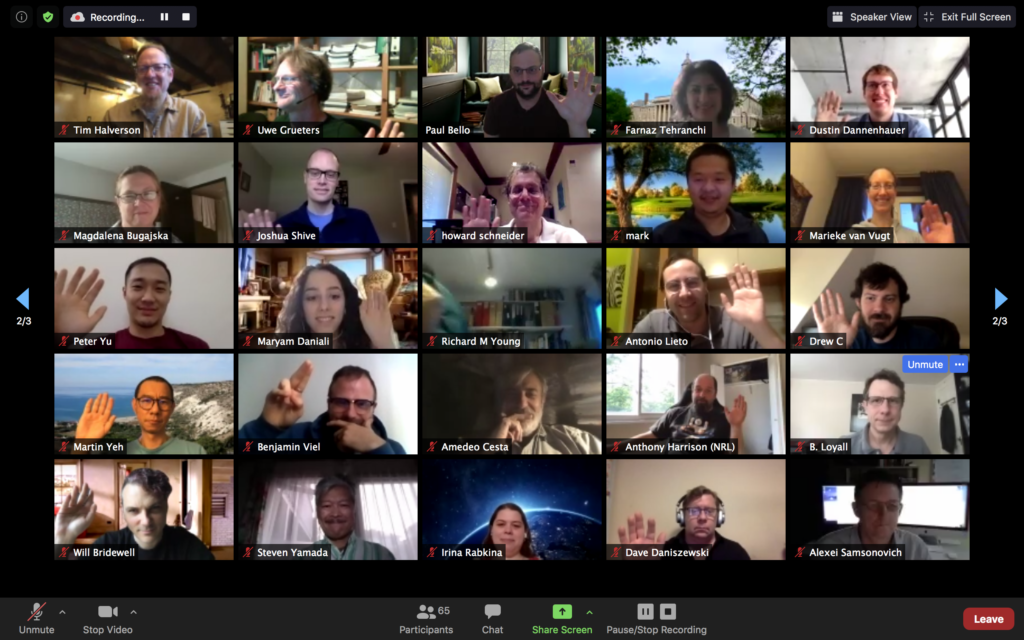Virtual International Symposium on Cognitive Architecture (VISCA 2020)
June 4-5, 2020: 10am-5:30pm EDT
Hosted by the Soar Research Group, University of Michigan
John Laird (laird@umich.edu): Organizer
VISCA-2020 is a wrap! We had 375 registrants from around the world and >160 people online at once.
Thanks to all of the speakers. Great talks!!! Videos of talks will be added soon (June 12 at the latest).
Thanks to the gods of Zoom (and the University of Michigan for having a license). One or two small glitches, but this would have not been possible even a year ago.
Thanks to my students for helping organize and run the symposia.
We will repeat next year VISCA-2021: May/June 2021. It will still be invited virtual talks, but with some twists to make it more interactive with more discussion.
Original Call: Over the last forty years, there has been continual research in cognitive architecture – the computational substructure underlying cognition. VISCA is an attempt to bring together leaders in the field to share their current research across the breadth of cognitive architecture, including research on modeling human behavior, neural-cognitive architectures, functional capabilities of cognitive architectures, components of cognitive architectures, and applications. Our goal is to enable anyone in the world to participate. Please share this webpage with colleagues and friends who might be interested.
There are no registration fees or other costs. All that we ask is that you register so we can provide you access to the symposium and the materials we collect. The symposium will be a live event, June 4-5, 10am-5:30pm EDT both days, with limited questions following each presentation (and some short breaks). We plan to capture the lectures and make them available after the symposium.
We will use Zoom Webinar for the presentations. An email will be sent to all registrants with details of how to participate. Email laird@umich.edu if you have questions.
For those interested in the Soar cognitive architecture, the Soar Workshop will be held June 3, and for those interested in broader questions of Cognitive Systems, the Advances in Cognitive Systems Conference will be help on August 10th-12th.
Speakers and Talks
| Speaker | Home Institution | Talk Title |
|---|---|---|
| John Anderson | Carnegie Mellon University | Learning to Play Video Games without Instruction |
| Paul Bello | Naval Research Labs | Recent Progress on Intentions and Intentional Action in the ARCADIA Cognitive System |
| Dongkyu Choi | A*STAR, Singapore | An Integrative Approach to Collaborative Intelligence |
| Chris Eliasmith | University of Waterloo | Spaun 2.0: Sometimes bigger is better |
| Ken Forbus | Northwestern University | Analogy versus Rules in Cognitive Architecture |
| Laura Hiatt | Naval Research Labs | Using Cognitive Models to Train Big Data Models with Small Data |
| David Kieras | University of Michigan | Why Newell was Right: Constructing Explanatory Models for Visual Search |
| John Laird | University of Michigan | Introduction to Cognitive Architecture |
| Pat Langley | Institute for the Study of Learning and Expertise | Continuous Planning and Adaptive Control in the PUG Architecture |
| Christian Lebiere | Carnegie Mellon University | Optimizing Interaction Using Personalized Models of Decision Making |
| Chris Myers | Air Force Research Labs | The Problem(s) with Synthetic Teammates |
| Shiwali Mohan | PARC | Exploring the Role of Common Model of Cognition in Designing Adaptive Coaching Interactions for Health Behavior Change |
| Frank Ritter | Penn State University | Extending ACT-R with JSegMan to Perform a Long Task with Implications for Perception, Motor Output, Fatigue, and Motivation |
| Terry Stewart | University of Waterloo | Using Neural Representations of Time and Space within a Cognitive Architecture |
| Andrea Stocco& Catherine Sibert | University of Washington | Exploring Cognitive Architectures in the Era of Large Brain Data |
| Ron Sun & Can Mekik | Rensselaer Polytechnic Institute | Clarion and Raven’s Matrices |
| Niels Taatgen | University of Groningen | Understanding Intelligence with a Multi-layer Cognitive Architecture |
| Greg Trafton | Naval Research Labs | Matching Cognitive Models to Individuals: A Different Approach |
| Volkan Ustun & Paul Rosenbloom | University of Southern California | The Sigma Cognitive Architecture and System |
| Matthew Versaggi | Optum | How UHG/Optum Technology is Gearing Up to use Cognitive Technology in Healthcare |



 MENU
MENU 
